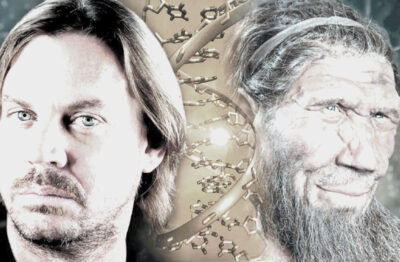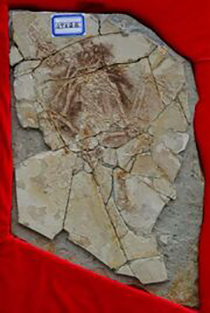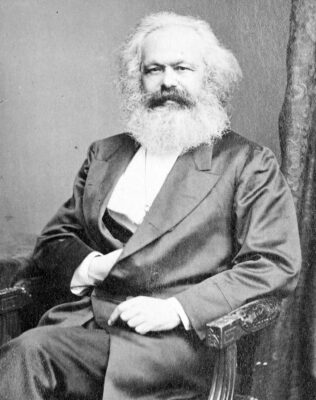by Richard William Nelson | May 9, 2010
 In 1856, just three years before the publication of The Origin of Species by Means of Natural Selection, the first Neanderthal in the fossil record was discovered in the Neander Valley limestone quarry located in Germany.
In 1856, just three years before the publication of The Origin of Species by Means of Natural Selection, the first Neanderthal in the fossil record was discovered in the Neander Valley limestone quarry located in Germany.
In The Descent of Man, Darwin argued against the concept that the Neanderthals were humans’ ancestors based on the Neanderthal skull’s larger size. “Nevertheless,” Darwin noted,
“It must be admitted that some skulls of very high antiquity, such as the famous one of Neanderthal, are well developed and capacious.”
Continue Reading
by Richard William Nelson | Apr 25, 2010
 Each fossil record discovery has a unique story, and the Archaeoraptor matter is undoubtedly no exception. In November 1999, a feature article in National Geographic titled “Feathers for T. Rex? New Birdlike Fossils Are Missing Links In Dinosaur Evolution” turned out to be one of the most spectacular debacles in the history of paleontology, rivaling the Piltdown Man saga. The article alleged –
Each fossil record discovery has a unique story, and the Archaeoraptor matter is undoubtedly no exception. In November 1999, a feature article in National Geographic titled “Feathers for T. Rex? New Birdlike Fossils Are Missing Links In Dinosaur Evolution” turned out to be one of the most spectacular debacles in the history of paleontology, rivaling the Piltdown Man saga. The article alleged –
“A true missing link in the complex chain that connects dinosaurs to birds.”
Discovered in the northeastern Liaoning Province of China in 1997 by farmers (pictured left), the fossil appeared to have a bird’s body with a small, terrestrial dinosaur’s teeth and tail. The name given to the fossil, Archaeoraptor liaoningensis, is in recognition of its discovery site.
Continue Reading
by Richard William Nelson | Apr 18, 2010
 Darwin had a significant influence on Karl Marx (pictured left). Struggle and survival are central to Darwin’s theory of evolution. The full 1859 title of The Origin is – On the Origin of Species by Means of Natural Selection and the Survival of the Fittest in the Preservation of Favoured Races.
Darwin had a significant influence on Karl Marx (pictured left). Struggle and survival are central to Darwin’s theory of evolution. The full 1859 title of The Origin is – On the Origin of Species by Means of Natural Selection and the Survival of the Fittest in the Preservation of Favoured Races.
Darwin’s premise on survival and struggle in nature paralleled Karl Marx’s premise on social class struggle. Marx summarized the importance of “struggle” in the first line of chapter one of The Communist Manifesto, published in 1848 –
“The history of all hitherto existing society is the history of class struggles.”
Continue Reading
by Richard William Nelson | Apr 4, 2010

Leaving studies in medicine at the University of Edinburgh after the first year and fearing that his son would “ne’er do well,” his father [Robert Darwin], a practicing physician, enrolled Charles at Christ’s College (pictured left), University of Cambridge, in 1827.
His father reasoned that a Bachelor of Arts degree in theology would qualify Darwin to become financially independent as a Church of England clergyman—a guaranteed government professional with a comfortable income.
Continue Reading
by Richard William Nelson | Mar 21, 2010
 The consensus on the scientific validity of Charles Darwin’s theory of natural selection varies even among evolution scientists.
The consensus on the scientific validity of Charles Darwin’s theory of natural selection varies even among evolution scientists.
Richard Dawkins, perhaps the most famous advocate of evolution in the twenty-first century, explained that natural selection represents a “non-random survival of randomly varying hereditary instructions” in the article “The Illusion of Design,” published in the Natural History Magazine.
While Dawkins’ explanation of natural selection is widely popular, a consensus amongst evolutionary scientists remains a contentious issue.
Continue Reading
 In 1856, just three years before the publication of The Origin of Species by Means of Natural Selection, the first Neanderthal in the fossil record was discovered in the Neander Valley limestone quarry located in Germany.
In 1856, just three years before the publication of The Origin of Species by Means of Natural Selection, the first Neanderthal in the fossil record was discovered in the Neander Valley limestone quarry located in Germany.
 Each
Each  Darwin had a significant influence on
Darwin had a significant influence on 
 The consensus on the scientific validity of Charles Darwin’s theory of
The consensus on the scientific validity of Charles Darwin’s theory of 